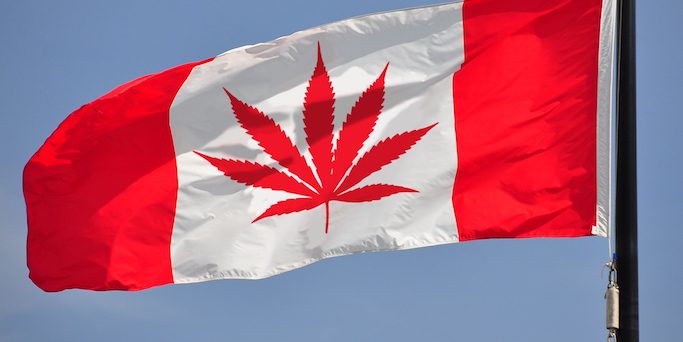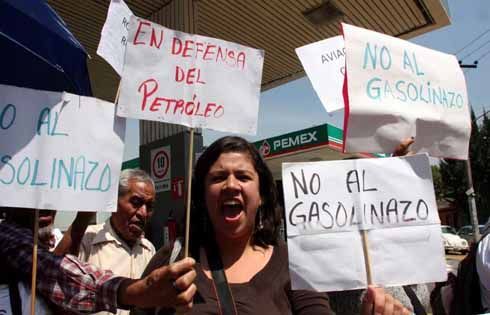Julien Daigneault is a member of Alternative Socialiste (CWI in Quebec).
 The Federal Liberal government legalized recreational marijuana use in Canada on October 17. However, they have done it in a way to favour their rich friends on Bay Street. Production is concentrated in a few large companies. This will destroy many small producers, such as in rural BC where cannabis growing provided employment and income to towns suffering from the forestry companies closing down operations.
Each province has different rules for the sale and use of cannabis. Ontario planned to sell cannabis through a subsidiary of the Liquor Control Board, Ontario Cannabis Store, a publicly-owned corporation. The newly elected Ontario conservatives changed the rules so that Ontario Cannabis Storewill sell be no longer part of the Liquor Control Board and only sell online. Private retailers will open physical stores.
Below is a translation of an article by Julien D from Alternative Socialiste, Québec, about Québec’s new rules.
The intention of Québec’s governing Coalition Avenir Québec (CAQ) to toughen up the federal regulatory framework relating to the consumption of cannabis is drawn in the image of the interests this party supports: those of owners and large private companies. “Legalization” in Québec will place greater restrictions on cannabis consumption for the majority of the population. The privatization of production and the precarious working conditions for new employees of the Societequebecoise du cannabis (SQDC) will only profit the elite.
The new premier François Legault toes the hard line. His government is considering banning cannabis consumption in all public places in Québec. Consumption will be restricted to private residences. The fear of cannabis has seized more than thirty municipalities, including Saguenay, Québec City, Mascouche, and Repentigny, which have already made similar rules. Five of the nineteen electoral districts of Montréal, are also considering banning cannabis consumption in public places.
Rules that favour owners…
The CAQ’s and some municipalities’ rules allow landlords to decide whether to permit consumption in their buildings. Combined with the banning of consumption in public areas, such a rule would have the effect of legalizing consumption for owners, while making it illegal for tenants. In cities like Montréal, where nearly 60% of the population are renters, this two-tier legalization will allow consumption only for the well-off.
However, cities like Montréal, Gatineau, Trois-Rivières, Shawinigan and Rimouski are considering applying the same laws for cannabis as for tobacco. These cities will permit cannabis consumption in public places, with the exception of school grounds, hospitals, sports grounds, terraces, bike lanes and bus stops. A major rift is foreseeable between these municipalities and the government of Québec.
… and hurt the young
Scientific studies show that using tobacco or alcohol poses greater risks to health than cannabis does. So, why more regulation? This is where the prohibitionists fall into exaggerations and moral arguments aimed at “protecting” the young. And yet, in contrast to the prior relative tolerance, the hardening of the legal framework will have the effect of greater repression of cannabis consumption than before, particularly among youth.
This tightening of the rules, coupled with the CAQ plan to raise the age of cannabis consumption to 21 years, risks forcing consumption to become hidden and harmful to health. Eighteen to 21-year-olds, who consume the most cannabis, are at risk of continuing to buy on the black market.
Mobilization of cannabis consumers will be essential in combatting the CAQ’s intent to divide them based on age or living situation. Everyone has a right to a safe product, that is to say, accessible and regulated, with a known THC content, traceability and secure points of sales.
Doubling up for better exploitation
The CAQ’s politics of division is in line with that of the Québec Liberal party during its management of cannabis legalization. Rather than completely integrating activities linked to cannabis with the Societe des alcools du Québec (SAQ, or Liquor Board), Philippe Couillard’s Liberals created a subsidiary, the Societequebecoise du cannabis (SQDC), which uses the infrastructure of the SAQ with the exception of its outlets. The result: the SQDC sells cannabis in its own stores with its own non-unionized employees.
This line of approach doubles the expenses for premises rather than using existing SAQ branches. This situation has the effect of creating administrative posts at the SQDC while the SAQ is attempting to cut office jobs. As well, working conditions are worse at the SQDC. For example, the starting wage is $14 an hour, while it is $19.33 an hour (plus 18.4% in benefits) at the SAQ.
And let’s recall that the unionized employees of the SAQ have been in negotiations for over a year and a half against an employer that wants to make their work schedules more precarious and reduce the number of positions. Solidarity between the wage earners at the SQDC and the SAQ is essential to avoid the undermining of their working conditions. Alternative Socialiste supports a unionization drive of the employees of the SQDC.
Production for the capitalists
The Canadian government, led by Justin Trudeau’s Liberals, created the industry of cannabis production in 2017. It then issued cultivation licences in limited numbers to several ex-politicians and friends of the party. These new entrepreneurs immediately formed the Canadian Association of Cannabis Producers and hired lobbyists with the goal of obtaining government subsidies, favourable electricity rates, and permission to hire foreign workers at poverty wages.
Even before legalization, an oligopoly formed after a series of fusions/acquisitions valued at several billion dollars. The major Canadian cannabis producers, such as Canopy Growth, Aurura and Tilray, each have capitalizations approaching or exceeding $10 billion on the stock exchange. The various levels of government will collect almost none of this financial windfall, except for the taxes and fines that will come from people’s pockets. They will, however, be responsible for dealing with the problems of pollution or public health created by this new industry.
For the nationalization of the cannabis industry
The cannabis industry will have an enormous impact on health, agriculture, and the technological and economic development of Québec. Only complete nationalization, from production to commercialization, under workers’ control, will determine the development and the effects of the cannabis industry. Only such a nationalization, combined with that of all important sectors of the economy, will allow us to respond truly to the needs of the people and thus create a socialist society. Let’s not allow the private sector and sell-out politicians take away our resources, our jobs, and our leisure activities.
Alternative Socialiste appeals to all employees of the SAQ and the SQDC, as well as all who consume cannabis, to organize for the following demands:
The Federal Liberal government legalized recreational marijuana use in Canada on October 17. However, they have done it in a way to favour their rich friends on Bay Street. Production is concentrated in a few large companies. This will destroy many small producers, such as in rural BC where cannabis growing provided employment and income to towns suffering from the forestry companies closing down operations.
Each province has different rules for the sale and use of cannabis. Ontario planned to sell cannabis through a subsidiary of the Liquor Control Board, Ontario Cannabis Store, a publicly-owned corporation. The newly elected Ontario conservatives changed the rules so that Ontario Cannabis Storewill sell be no longer part of the Liquor Control Board and only sell online. Private retailers will open physical stores.
Below is a translation of an article by Julien D from Alternative Socialiste, Québec, about Québec’s new rules.
The intention of Québec’s governing Coalition Avenir Québec (CAQ) to toughen up the federal regulatory framework relating to the consumption of cannabis is drawn in the image of the interests this party supports: those of owners and large private companies. “Legalization” in Québec will place greater restrictions on cannabis consumption for the majority of the population. The privatization of production and the precarious working conditions for new employees of the Societequebecoise du cannabis (SQDC) will only profit the elite.
The new premier François Legault toes the hard line. His government is considering banning cannabis consumption in all public places in Québec. Consumption will be restricted to private residences. The fear of cannabis has seized more than thirty municipalities, including Saguenay, Québec City, Mascouche, and Repentigny, which have already made similar rules. Five of the nineteen electoral districts of Montréal, are also considering banning cannabis consumption in public places.
Rules that favour owners…
The CAQ’s and some municipalities’ rules allow landlords to decide whether to permit consumption in their buildings. Combined with the banning of consumption in public areas, such a rule would have the effect of legalizing consumption for owners, while making it illegal for tenants. In cities like Montréal, where nearly 60% of the population are renters, this two-tier legalization will allow consumption only for the well-off.
However, cities like Montréal, Gatineau, Trois-Rivières, Shawinigan and Rimouski are considering applying the same laws for cannabis as for tobacco. These cities will permit cannabis consumption in public places, with the exception of school grounds, hospitals, sports grounds, terraces, bike lanes and bus stops. A major rift is foreseeable between these municipalities and the government of Québec.
… and hurt the young
Scientific studies show that using tobacco or alcohol poses greater risks to health than cannabis does. So, why more regulation? This is where the prohibitionists fall into exaggerations and moral arguments aimed at “protecting” the young. And yet, in contrast to the prior relative tolerance, the hardening of the legal framework will have the effect of greater repression of cannabis consumption than before, particularly among youth.
This tightening of the rules, coupled with the CAQ plan to raise the age of cannabis consumption to 21 years, risks forcing consumption to become hidden and harmful to health. Eighteen to 21-year-olds, who consume the most cannabis, are at risk of continuing to buy on the black market.
Mobilization of cannabis consumers will be essential in combatting the CAQ’s intent to divide them based on age or living situation. Everyone has a right to a safe product, that is to say, accessible and regulated, with a known THC content, traceability and secure points of sales.
Doubling up for better exploitation
The CAQ’s politics of division is in line with that of the Québec Liberal party during its management of cannabis legalization. Rather than completely integrating activities linked to cannabis with the Societe des alcools du Québec (SAQ, or Liquor Board), Philippe Couillard’s Liberals created a subsidiary, the Societequebecoise du cannabis (SQDC), which uses the infrastructure of the SAQ with the exception of its outlets. The result: the SQDC sells cannabis in its own stores with its own non-unionized employees.
This line of approach doubles the expenses for premises rather than using existing SAQ branches. This situation has the effect of creating administrative posts at the SQDC while the SAQ is attempting to cut office jobs. As well, working conditions are worse at the SQDC. For example, the starting wage is $14 an hour, while it is $19.33 an hour (plus 18.4% in benefits) at the SAQ.
And let’s recall that the unionized employees of the SAQ have been in negotiations for over a year and a half against an employer that wants to make their work schedules more precarious and reduce the number of positions. Solidarity between the wage earners at the SQDC and the SAQ is essential to avoid the undermining of their working conditions. Alternative Socialiste supports a unionization drive of the employees of the SQDC.
Production for the capitalists
The Canadian government, led by Justin Trudeau’s Liberals, created the industry of cannabis production in 2017. It then issued cultivation licences in limited numbers to several ex-politicians and friends of the party. These new entrepreneurs immediately formed the Canadian Association of Cannabis Producers and hired lobbyists with the goal of obtaining government subsidies, favourable electricity rates, and permission to hire foreign workers at poverty wages.
Even before legalization, an oligopoly formed after a series of fusions/acquisitions valued at several billion dollars. The major Canadian cannabis producers, such as Canopy Growth, Aurura and Tilray, each have capitalizations approaching or exceeding $10 billion on the stock exchange. The various levels of government will collect almost none of this financial windfall, except for the taxes and fines that will come from people’s pockets. They will, however, be responsible for dealing with the problems of pollution or public health created by this new industry.
For the nationalization of the cannabis industry
The cannabis industry will have an enormous impact on health, agriculture, and the technological and economic development of Québec. Only complete nationalization, from production to commercialization, under workers’ control, will determine the development and the effects of the cannabis industry. Only such a nationalization, combined with that of all important sectors of the economy, will allow us to respond truly to the needs of the people and thus create a socialist society. Let’s not allow the private sector and sell-out politicians take away our resources, our jobs, and our leisure activities.
Alternative Socialiste appeals to all employees of the SAQ and the SQDC, as well as all who consume cannabis, to organize for the following demands:
- The right to the safe consumption of cannabis;
- Free medical cannabis;
- The unionization of all subsidiaries of the SAQ, including the SQDC;




